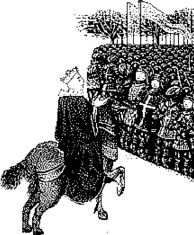A peasants' revolution
Two kings Shakespeare wrote about were involved in spectacular uprisings by the peasant class: Richard II and Henry VI.
How--and why--it started
By the Late Middle Ages, conditions for the peasant labourers had become intolerable: the population had been severely reduced by the Black Death*, and protracted wars had led to economic depression and increased government taxation*.
The revolt of 1381 began in Essex and spread rapidly across southeast England, becoming a massive popular uprising made up of landowners and artisans as well as common workers. Wat Tyler appeared as leader of the rebels in Kent. Tyler and Richard II eventually met face-to-face--a confrontation which gave Richard the reputation of a child hero. Click here for more.
Footnotes
-
The Black Death
The shortage of labour caused by the Black Death led to a doubling of peasants' wages. In reaction, government and nobles tried both to freeze wages at pre-plague levels and to increase labour services owed to landlords.
-
Taxation
The cost of the war in France brought the introduction of the poll tax (resurrected in modern Britain), which affected all subjects alike, regardless of wealth, and was assessed three times from 1377 to 1380. Resistance of attempts to enforce the tax also became a focus for popular resentment concerning government corruption and injustice at the local level.
